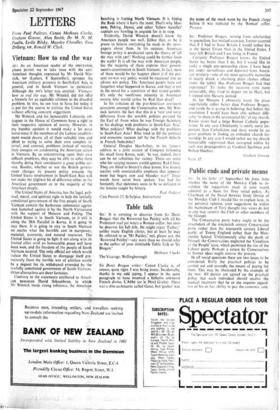Vietnam: How to end the war
LETTERS
From Paul Pulitzer, Canon Methuen Clarke, Graham Greene, Alan Smith, Dr M. N. M. Paulin, Leslie Bilsby, Maurice Chandler, Toni Dtiberg, MP, Ronald W. Clark.
Sir: As an American reader of the SPECTATOR, please permit me to take issue with the anti- American thoughts expressed by Mr David Win- nick, MP (Letters, 8 September), apropos the American military presence in South-East Asia in general, and in South Vietnam in particular. Although the me's letter was entitled: Vietnam: how to end the war, Mr Winnick did not offer a formula for an equitable solution to the dreadful problem. In this, he ran true to form for today it is par for the course to criticise the United States without offering concrete suggestions.
Mr Winnick and his honourable Labourite col- leagues in the House of Commons have a right to their respective opinions of course. However, in my humble opinion it would make a lot more horse-sense if the members of the Labour establish- ment would devote all of their valuable time and effort to trying to solve their own complex in- ternal, and external, problems instead of wasting their energies on condemning the American action in Vietnam. By so concentrating upon their own difficult problems, they may be able to solve them thereby doing their constituents a great public ser- vice. Besides, whether or not the British govern- ment changes its present policy towards the United States involvement in South-East Asia will not make the slightest bit of difference either to the American government or to the majority of the American people.
The United States of America has the legal, poli- tical, moral, and spiritual right to help the lawfully constituted government of the free people of South Vietnam contain the barbarous communist aggres- sion launched against it by the North Vietnamese with the support of Moscow and Peking. The United States is in South Vietnam, as it still is along the 38th Parallel in Korea. It is going to stay there. It is going to stay in South Vietnam no matter what the horrible cost in manpower, material, economic, and natural resources. The United States is going to fight it out along with its limited allies until an honourable peace will have been won, and the freedom of the people of South Vietnam secured. The only official act which would induce the United States to disengage itself pre- maturely from the terrible war of attrition would be a request for its withdrawal extended by the lawfully constituted government of South Vietnam, Other alternatives are sheer fantasies.
Contrary to the statements attributed to Ameri- can newsman David Schoenbrun, to which Mr Winnick made strong reference, the American bombing is hurting North Vietnam. It is hitting the Reds where it hurts the most. That's why Mos- cow, Peking, Hanoi, and other 'fellow traveller' capitals are howling in anguish for it to stop.
Evidently, David Winnick doesn't know the American people too well. Either that, or he is prone to believe everything he reads in the news- papers about them. In his opinion, American foreign policy is predicated upon the theory of 'all the way with LBW!' Nothing could be further from the truth! It is all the way with American people, for the majority of them endorse their govern- ment's commitment in South Vietnam. In fact, most of them would be far happier about it if the pre- sent no-win war policy would be escalated into an all-out win policy. The American people have not forgotten what happened in Korea, and they're not in the mood for a repetition of that stupid gambit. It's only the vociferous minority in American society who would rather be Red than dead!
In his criticism of the pro-American sentiment prevalent amongst the Conservative mes, Mr Win- nick laments the fact that this is a 'vast and sorry difference from the sensible policies pursued by the Earl of Avon when he was Foreign Secretary in his dealings with problems in South-East Asia.' What policies? What dealings with the problems in South-East Asia? Who tried to fill the political and economic vacuum left by the French debacle in French Indochina?
General Douglas MacArthur, in his famous address to a joint session of Congress following his recall from Korea, said: 'In war, indeed, there can be no substitute for victory. There are some who for varying reasons would appease Red China. They are blind to history's clear lesson. For history teaches with unmistakable emphasis that appease- ment but begets new and bloodier war!' Truer words have never been spoken. Too bad for humanity that statesmen seem to be so deficient in the lessons taught by history.


































 Previous page
Previous page